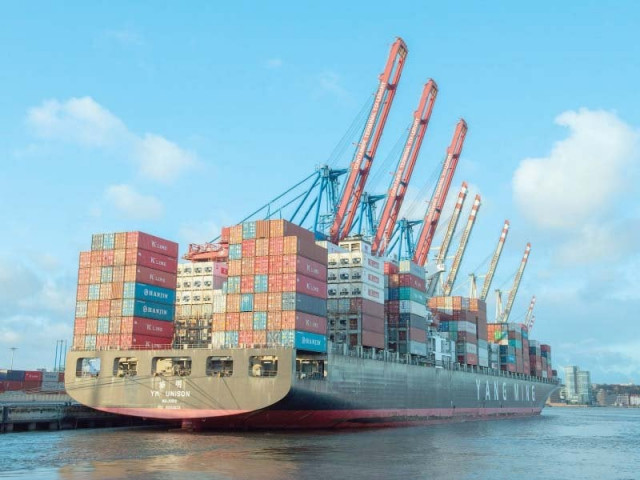Exports set to grow further after rupee’s fall: Dagha
Foreign shipments have increased 11% in the first five months of FY18; commerce secretary says trend will continue

Dagha said the imposition of regulatory duty in Oct was meant to discourage the import of consumer goods, categorically stating that the higher rate on the import of raw materials was not the government’s intention. PHOTO: FILE
Commerce Secretary Younus Dagha said exports have increased during the five months of the ongoing fiscal year, and are set to go further north after the central bank allowed free-market dynamics to determine the rupee’s value to the dollar last month.
Exports in July-November increased by 10.5% to over $9 billion but these were only equal to 39% of the annual export target of $23.1 billion. In absolute terms, export receipts were up by $857 million during the first five months.
While the increase was hailed as a positive, exporters said rupee depreciation was crucial to ensure sustained growth in exports. Export receipts are crucial for Pakistan that faces continuous pressure on its foreign exchange reserves given the high import volume and rising oil prices.
Resultantly, the currency fell close to 5% within a few days to reach over Rs110 to the US dollar, providing much-needed relief to exporters as well as the business community that predicted such a development on the back of an increasing current account deficit.
“Since Pakistan imports a lot of raw materials for the exportable products, it’s difficult to predict the increase in exports,” Dagha told The Express Tribune when asked what could be the increase in exports.
“Currently, an increase of 10-11% is being witnessed so one can hope exports would continue to increase more than this rate.”
Meanwhile, Dagha said the imposition of regulatory duty in October was meant to discourage the import of consumer goods, categorically stating that the higher rate on the import of raw materials was not the government’s intention, but a by-product of the decision.
He said the import of raw material subjected to RD will certainly be taken into consideration and immediately withdrawn so that the cost of production, competitiveness and exportability of industries are not affected.
The ministry has recently withdrawn duty on 35 raw materials, he informed.
“The situation in terms of duty on consumer items may worsen further in the days to come,” he said while speaking in a meeting at the Karachi Chamber of Commerce and Industry (KCCI).
“We are willing to serve exporters, but anyone importing consumer items should not expect any facilitation from the commerce ministry,” he added, hinting at further imposition of duty on consumer items.
Referring to concerns expressed by former KCCI president Zubair Motiwala on the 4% rebate to yarn exporters, he agreed that this incentive should not be given and the issue has also been raised by the commerce ministry. “We will try to deal with it in the next budget,” he added.
Another former KCCI president Siraj Kassam Teli said massive discretionary powers were granted to FBR officials in recent budgets, to the point that chambers and associations that appreciated empowering the tax collecting body are now left to criticise it.
He was of the opinion that laws, regulations and acts were devised in such a manner to empower FBR’s staff even at the lower level to harass the business and industrial community.
“These laws and powers are not meant to increase revenue and attract new taxpayers but to create hurdles and harass existing taxpayers. After seeing the miseries and hardships suffered by loyal taxpayers, people prefer to stay outside the tax net.”
Separately, he said the business community is responsible for most of its issues because actual representatives are unable to give input due to the presence of fake and bogus trade bodies in the apex body of the country.
“About 40% of trade bodies are fake and bogus, which are not following the rules and regulations of the commerce ministry in terms of paperwork and documentation,” he added.
Published in The Express Tribune, January 9th, 2018.
Like Business on Facebook, follow @TribuneBiz on Twitter to stay informed and join in the conversation.



















COMMENTS
Comments are moderated and generally will be posted if they are on-topic and not abusive.
For more information, please see our Comments FAQ